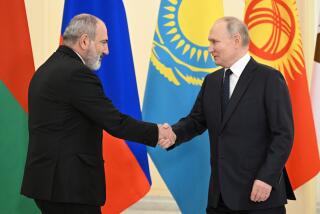Moderate Wins Armenia Election : Soviet Union: Radical nationalist who favors an immediate break with Moscow is a poor second.
- Share via
YEREVAN, Soviet Union — Armenians elected Levon Ter-Petrosyan their first president by a landslide, giving a massive boost to his middle-of-the-road policies on independence and preserving economic ties with the other Soviet republics, preliminary results indicated Thursday.
Ter-Petrosyan, the scholarly, soft-spoken chairman of the Armenian legislature, won 80% of the vote in Wednesday’s election, according to partial returns compiled by the Central Elections Commission. The figures were based on results from 60 of Armenia’s 67 electoral districts.
Radical nationalist Paruir Airikyan, leader of the Union for National Self-Determination, ran a poor second with 7.5% of the vote, the commission reported. Airikyan, once banished abroad by Soviet President Mikhail S. Gorbachev for his anti-Soviet views, advocates an immediate, complete break with Moscow.
Three other candidates--all nationalists but with varying stances on how to bring about Armenia’s secession from the Soviet Union--got the remaining 12.5% of the vote, the commission said.
Ter-Petrosyan did not linger in this Caucasus Mountain land north of Turkey to savor his victory, even more lopsided than what opinion polls had predicted. He flew to Moscow to confer with Gorbachev. The chief topic was expected to be Armenia’s long-running dispute with Azerbaijan over Nagorno-Karabakh, an Armenian enclave in neighboring Azerbaijan.
“Mr. Ter-Petrosyan is ready to see the devil himself, if the devil can help solve the Karabakh question,” said Ashot Antinian, chief of the Armenian legislature’s press center.
Many Armenians feel that Gorbachev has blatantly sided with Azerbaijan in their feud over the green, hilly rural district that has a predominantly Armenian population but has belonged to Azerbaijan since the 1920s. In hostilities between the neighboring republics sparked by the territorial dispute, more than 1,000 people have been killed in the last four years.
By giving themselves a president and a presidential system of rule, Armenians hope to be able to deal more effectively with a range of pressing, sometimes critical problems facing their republic as the unified political and economic system that had been the Soviet Union breaks up.
“First on the agenda is the problem of preparing for the coming winter,” Antinian said. “No matter who the president is, that is problem No. 1.”
Squeezed by a rail and road blockade mounted by Azerbaijan--through which the vast majority of rail traffic bound for Armenia used to pass--reserves of fuel oil and other sources of energy have fallen “catastrophically lower” than at this time in 1990, said Aram Avetisyan, an official with the Armenian legislature. Freight trains laden with grain, sugar and other badly needed commodities are now held up at the border at the Azerbaijan territory of Nakhichevan, Avetisyan said, while the Yerevan stores shelves are bare.
To end the blockade, the Armenian leadership will have to reach some sort of agreement with Azerbaijan over Nagorno-Karabakh, Armenian officials say.
At talks brokered by Russian Federation President Boris N. Yeltsin last month, the two feuding republics managed to sign a joint communique, but its stipulations--which include an end to the blockade--remain virtually unfulfilled.
Armenian leaders believe, however, that the situation will soon change, in part because of the clear-cut mandate by Ter-Petrosyan.
More to Read
Sign up for Essential California
The most important California stories and recommendations in your inbox every morning.
You may occasionally receive promotional content from the Los Angeles Times.










